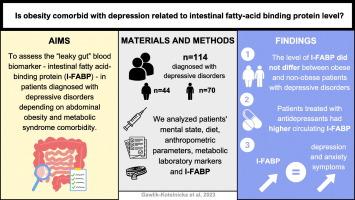Associations between intestinal fatty-acid binding protein and clinical and metabolic characteristics of depression
IF 5.3
2区 医学
Q1 CLINICAL NEUROLOGY
Progress in Neuro-Psychopharmacology & Biological Psychiatry
Pub Date : 2024-10-10
DOI:10.1016/j.pnpbp.2024.111170
引用次数: 0
Abstract
Introduction: The topic of increased intestinal permeability is associated with disruption of the intestinal barrier, leading to the “leaky gut” syndrome. Depressive disorders often coexist with abdominal obesity, metabolic syndrome, or its components and complications. Intestinal permeability has been proven to relate to all of the above. Methods: In this cross-sectional study, we aimed to assess the “leaky gut” blood biomarker - intestinal fatty acid-binding protein (I-FABP) - in 114 adult patients diagnosed with depressive disorders depending on abdominal obesity comorbidity, depression, anxiety, and stress level, or antidepressant use. The corrected p-value was set at 0.02. We analyzed patients' mental state, diet, anthropometric parameters, metabolic laboratory markers and I-FABP. Results: There was no difference in circulating I-FABP levels between obese and non-obese patients with depressive disorders (p = 0.648). Similarly, I-FABP levels were not different in patients with different emotional symptoms severity (p = 0.829 for self-assessed depression, p = 0.164 for anxiety, and p = 0.543 for stress). But, I-FABP levels differed significantly between patients treated and not treated with antidepressants (p = 0.011). In general linear model analysis treatment with antidepressants, anxiety severity level, their interaction, along with smoking status, drinks intake, and using dietary supplements were shown to significantly explain I-FABP variance (p < 0.001, R2adj = 0.261). Conclusions: Comorbid obesity did not increase intestinal permeability circulating marker, I-FABP, in the population of patients with depressive disorders. Treatment with antidepressants may be connected to higher I-FABP levels. Using dietary supplements, drinks intake, smoking status, or anxiety level may serve as explanatory factors.

肠道脂肪酸结合蛋白与抑郁症的临床和代谢特征之间的关系。
导言:肠道渗透性增加与肠道屏障破坏有关,导致 "肠漏 "综合征。抑郁症往往与腹部肥胖、代谢综合征或其组成部分和并发症同时存在。肠道渗透性已被证明与上述所有因素有关:在这项横断面研究中,我们根据腹型肥胖合并症、抑郁、焦虑和压力水平或抗抑郁药的使用情况,评估了 114 名被诊断为抑郁症的成年患者的 "肠漏 "血液生物标志物--肠脂肪酸结合蛋白(I-FABP)。校正后的 P 值定为 0.02。我们分析了患者的精神状态、饮食、人体测量参数、代谢实验室指标和 I-FABP:结果:肥胖和非肥胖抑郁症患者的循环 I-FABP 水平没有差异(p = 0.648)。同样,不同情绪症状严重程度的患者的 I-FABP 水平也没有差异(自评抑郁 p = 0.829,焦虑 p = 0.164,压力 p = 0.543)。但是,I-FABP 水平在接受抗抑郁药物治疗和未接受抗抑郁药物治疗的患者之间存在显著差异(p = 0.011)。在一般线性模型分析中,抗抑郁药物治疗、焦虑严重程度、它们之间的交互作用,以及吸烟状况、饮料摄入量和使用膳食补充剂都能显著解释 I-FABP 变异(p 2adj = 0.261):结论:在抑郁症患者中,合并肥胖并不会增加肠道渗透性循环标志物 I-FABP。使用抗抑郁药治疗可能与 I-FABP 水平升高有关。使用膳食补充剂、饮料摄入量、吸烟状况或焦虑程度可能是解释因素。
本文章由计算机程序翻译,如有差异,请以英文原文为准。
求助全文
约1分钟内获得全文
求助全文
来源期刊
CiteScore
12.00
自引率
1.80%
发文量
153
审稿时长
56 days
期刊介绍:
Progress in Neuro-Psychopharmacology & Biological Psychiatry is an international and multidisciplinary journal which aims to ensure the rapid publication of authoritative reviews and research papers dealing with experimental and clinical aspects of neuro-psychopharmacology and biological psychiatry. Issues of the journal are regularly devoted wholly in or in part to a topical subject.
Progress in Neuro-Psychopharmacology & Biological Psychiatry does not publish work on the actions of biological extracts unless the pharmacological active molecular substrate and/or specific receptor binding properties of the extract compounds are elucidated.

 求助内容:
求助内容: 应助结果提醒方式:
应助结果提醒方式:


